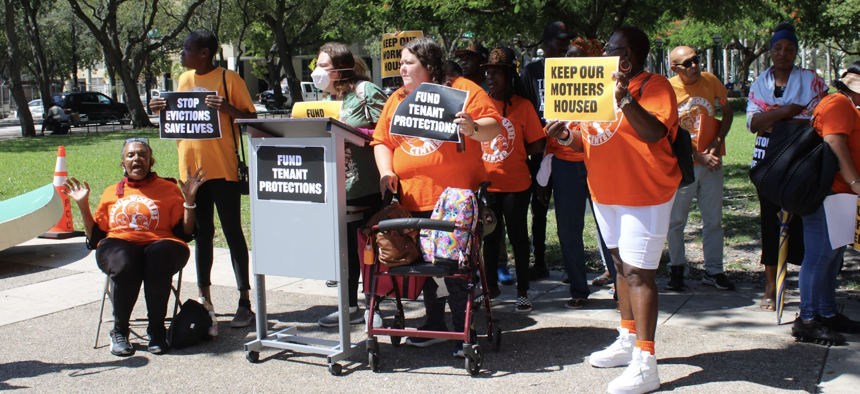Policy
First Miami-Dade budget hearing grapples with housing crisis, growth of government
A panoply of issues was addressed at the budget hearing, in addition to the housing crisis: Trouble at the county’s animal services department; a slow moving crisis for the county’s solid waste program; pressure to increase transit services.

Members of the Miami Workers Center, along with supporters and tenants, gather behind a podium with a sign that reads "Fund Tenant Protections," Thursday, Sept. 7, 2023. Photo by Julia Cooper/WLRN
The first Miami-Dade County budget meeting for the 2023-24 fiscal year amounted to a parade of sorrows, as resident after resident sounded the alarm on the unaffordable cost of housing in a place that has become the epicenter of the nation’s housing crisis.
There was Dinara Reyes, the Cuban immigrant who was evicted from her home in September of last year: ”I’m just asking for help, that you give me a voucher or something so I can feel better, have a little peace. It’s what I need, I’ve been on the street too long.”
Then Nanette Jean-Pierre, a Haiti-born resident of North Miami: “I am working ... in the field and gardening, and the wage is not enough for me to pay rent.”
Miami resident Pascal Romaine: “So many are forced to make tough choices between which bill will be paid every day. And so many can simply not afford the cost of living.”
The speakers, as well as the dozens of protesters who were gathered outside, asked commissioners to approve $5 million in rental assistance and eviction diversion programs. It's a small drop of funding in the record-breaking $11.7 billion blueprint being considered for this year’s budget, they say — equivalent to just 0.04% of the total amount.
A panoply of issues were addressed at the budget hearing, in addition to the housing crisis: Trouble at the county’s animal services department; a slow moving crisis for the county’s solid waste program; and pressure to increase transit services.
“We definitely learned what is happening in the community and what the needs are today,” said Mayor Daniella Levine Cava after listening to hours of public testimony. “We have staff here responding to those who ask for help right now. We are here."
If the budget is passed, a total of $4.7 million would go toward reopening the county’s Emergency Rental Assistance Program, or ERAP. ERAP falls under the authority of the county’s public housing and community development department and would provide low and moderate-income renters with one time benefits to assist with rent payments.
The $4.7 million for ERAP is coming from a separate program that was intended to give subsidies to landlords for keeping rents affordable, after that program has spent only a tiny fraction of funds its first year, as WLRN previously reported.
The emergency rental assistance program has helped over 21,000 families pay rent since it was started in 2020 with federal funds at the height of the COVID-19 pandemic.
An additional $259,000 would be added into the county's Eviction Diversion Pilot Program, which was approved in March. That would add to their current $2.9 million fund.
Protesters decry the affordability crisis
Outside of the commission chambers before the meeting, speakers boomed with music and testimonials from renters affected by Miami’s housing affordability crisis, which was officially declared last year.
A group of about 35 people donning bright orange shirts were brought together by the Miami Workers Center, an organization that advocates on behalf of working-class Miami-Dade tenants and families.
Among them was Claudia Ericka Romero Perez. Perez is just one of thousands across the county dealing with the aftermath of rent hikes and eviction. After being evicted from her Aventura apartment in 2021, she’s struggled to find the resources to keep herself, her 9-year-old daughter and mother housed.
“I honestly don’t know what I’m going to do,” Perez said. “I don’t want to end up in the streets again and my time is up right now at the shelter where I am.”
“Right now we need tenant protections more than ever.” said Miami Workers Center communications manager Lizzie Suarez. “Just like in criminal court and housing court, [tenants] should also have the right to legal counsel because we’ve seen in other cities where when they do, they actually have a higher chance of staying housed.”
The state government passed a law earlier this year that nullified all local tenant protection laws, making the local government nearly powerless to enact tenant protections. The state law passed after the Miami-Dade commission unanimously passed major tenant protections last year.
The Eviction Diversion Pilot Program was not included in that state law, and can continue to operate. It assists tenants who might be facing eviction by pairing them with legal representation and other resources in hopes of keeping people in their homes. Yet, the program is a pilot and if it does not continue to receive funding it will cease to operate.
“There’s a gap in the period where we expected funds to run out in the next fiscal year,” Suarez said of the program. “So really, we’re just fighting to make sure the program can continue.”
The program, which has been running for just a few months, provides free legal assistance to tenants at-risk of eviction through the Legal Services of Greater Miami. The program funds are spread across five organizations, including the Miami Workers Center, which canvasses households facing eviction and gives training on tenants’ rights and programs.
Other program partners include the Community Justice Program, Cuban American Bar Association Pro Bono Legal Services, Haitian Lawyers Association and the Wilkie D. Fergusen, Jr., Bar Association.
“We've only been in place for a few months, we've already served 450 tenant’s families,” Jeffrey Hearn with Legal Services of Greater Miami told the commission. “In only a few months, canvassers from the Miami Workers Centers have contacted nearly 1600 tenants at their door having early intervention in eviction cases. This is innovative. It puts us in place to be one of the national leaders.”
Yet other parts of county policies have not seen nearly the impact that was imagined. Out of an $85 million pot of money passed last year for the mayor’s HOMES Plan, much of the money was left unspent and would be rolled over into this year’s budget.
For example, a program on helping property owners renovate aging buildings to keep them affordable only spent $1 million out of the $9 million it was given, pointed out commissioner Raquel Regalado. A mortgage relief program had 1,745 applicants, but only paid 23 people in a whole year. The landlord subsidy program only spent about 3% of its $15 million budget — less than half a million dollars — and yet it is supposed to get $7 million again this year.
By contrast ERAP, the emergency rental assistance program, was a huge success, by contrast. So was a developer inflation relief program to assist builders in completing affordable housing projects that have had supply chain issues.
“I think that we need to look closely at HOMES and see what is working and what is not working,” said Regalado. “It is the number one complaint that we get from people. So from what we did — let's do more of what worked and let's do less of what didn't.”
Despite a cut, taxes would still go up
The mayor’s proposed budget calls for a 1% property tax cut, after 1% was cut last year. However, two consecutive years of rate cuts does not mean families will pay less in taxes — as property values have increased, tax valuations are outpacing the technical reductions.
If the proposed budget is adopted, taxes would still go up.
Several homeowners — especially elderly homeowners on fixed incomes — complained that perpetually rising taxes are endangering their ability to stay in Miami-Dade. At some point, people might have to pick up and leave, speakers warned.
That’s not a hollow threat. The county’s population dropped by 79,535 between 2020 and 2022, the Wall Street Journal recently reported, citing an analysis of U.S. Census Bureau Data. Middle class residents hit by exploding cost of living in general — South Florida is the inflation hotspot of the nation, on top of the housing crisis — represent many of those who have left.
“No more taxes. No no new taxes, No more. It's too expensive to live in Miami-Dade County,” said Stanley Young, a chaplain at county jails in Miami-Dade.
“Never in my adult, home-owning years have I remembered the county cutting taxes,” said resident James Mills. “Seniors on fixed incomes and the middle and working classes are getting hammered in Dade County. Cut the taxes.”
Commissioner Roberto Gonzalez warned about the exploding size of the county budget, and said there is little to show for it.
“Last year, Miami-Dade County’s total budget was $10.39 billion. This year, the proposed budget is $11.69 billion,” he said. “That’s an extra $1.3 billion. And folks, when I talk to the people in my community, they are not seeing a 12% increase in services.”
If the county government revenue continues to grow at this rate, he warned, it will simply be unsustainable for residents.
Gonzalez pressed the county to try to identify potential cuts in redundant services, and to come up with a mechanism to give some money back to residents.
Other commissioners joined him in questioning the rapid growth of the county budget, and asking if all that growth is necessary.
Commissioner Micky Steinburg said: “I do caution us on being able to sustain at this level moving forward.” Her colleague J.C. Bermudez questioned if the budget is simply growing for growth's sake, without making decisions to address major infrastructure projects like addressing public transit.
“Let’s make decisions,” said Bermudez. “If we don’t know why we are increasing the size of government, then I have a concern.”
Commissioner Kevin Cabrera suggested an amendment to reduce general fund taxes by 3%, an amendment that failed.
"Sometimes the best way to make sure folks stay in their homes is to make sure they have more money in their pockets," he said.
Chairman Oliver Gilbert III noted that the county police department is included in the general fund, and argued that a 3% cut would amount to defunding the police.
“In the real world none of us are going to vote to defund the police,” he said. “If you don’t touch police you’re going to gut transit, you’re going to gut housing.”
Cabrera responded: “It’s not defunding the police.”
The proposed budget passed its first hearing at the end of a long night. One of the most contentious issues — a $38 increase per household to keep the trash fees to keep the Solid Waste Department fully operational — was passed by a 6-5 vote.
The next Miami-Dade budget hearing is scheduled for Sept. 21.
Julia Cooper contributed. This story is published as part of a collaboration between City & State Florida and WLRN News. Daniel Rivero is a member of WLRN's investigative reporting team. He can be reached at drivero@wlrnnews.org.
NEXT STORY: Florida Supreme Court keeps 'fairness and diversity' out of continuing judicial education requirements
